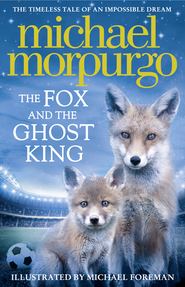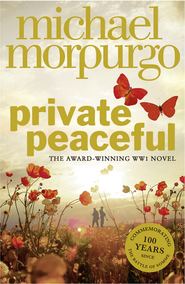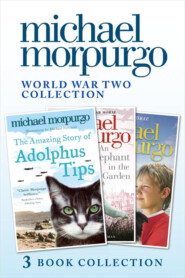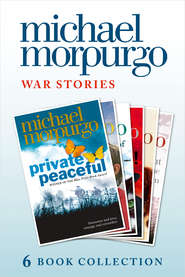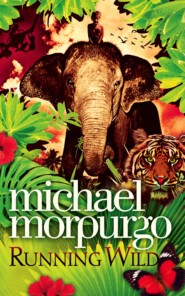По всем вопросам обращайтесь на: info@litportal.ru
(©) 2003-2024.
✖
World War One Collection: Private Peaceful, A Medal for Leroy, Farm Boy
Настройки чтения
Размер шрифта
Высота строк
Поля
“Yes sir,” I whisper, surprised I can find my voice at all.
We file in past him, hands behind our backs. Charlie smiles across at me as the two lines part: “Tiddlers” into my classroom, “Bigguns” into his. I’m the littlest of the Tiddlers. Most of the Bigguns are even bigger than Charlie, fourteen years old some of them. I watch him until the door closes behind him and he’s gone. Until this moment I have never known what it is to feel truly alone.
My bootlaces are undone. I can’t tie laces. Charlie can, but he’s not here. I hear Mr Munnings’ thunderous voice next door calling the roll and I am so glad we have Miss McAllister. She may speak with a strange accent, but at least she smiles, and at least she’s not Mr Munnings.
“Thomas,” she tells me, “you will be sitting there, next to Molly. And your laces are undone.”
Everyone seems to be tittering at me as I take my place. All I want to do is to escape, to run, but I don’t dare do it. All I can do is cry. I hang my head so they can’t see my tears corning.
“Crying won’t do your laces up, you know,” Miss McAllister says.
“I can’t, Miss,” I tell her.
“Can’t is not a word we use in my class, Thomas Peaceful,” she says. “We shall just have to teach you to tie your bootlaces. That’s what we’re all here for, Thomas, to learn. That’s why we come to school, don’t we? You show him, Molly. Molly’s the oldest girl in my class, Thomas, and my best pupil. She’ll help you.”
So while she calls the roll Molly kneels down in front of me and does up my laces. She ties laces very differently from Charlie, delicately, more slowly, in a great loopy double knot. She doesn’t look up at me while she’s doing it, not once, and I wish she would. She has hair the same colour as Billyboy, Father’s old horse — chestnut brown and shining — and I want to reach out and touch it. Then she looks up at me at last and smiles. It’s all I need. Suddenly I no longer want to run home. I want to stay here with Molly. I know I have a friend.
In playtime, in the school yard, I want to go over and talk to her, but I can’t because she’s always surrounded by a gaggle of giggling girls. They keep looking at me over their shoulders and laughing. I look for Charlie, but Charlie’s splitting conkers open with his friends, all of them Bigguns. I go to sit on an old tree stump. I undo my bootlaces and try to do them up again remembering how Molly did it. I try again and again. After only a short while I find I can do it. It’s untidy, and it’s loose, but I can do it. Best of all, from across the school yard Molly sees I can do it, and smiles at me.
At home we don’t wear boots, except for church. Mother does of course, and Father always wore his great hobnail boots, the boots he died in. When the tree came down I was there in the wood with him, just the two of us. Before I ever went to school he’d often take me off to work with him, to keep me out of mischief, he said. I’d ride up behind him on Billyboy and hang on round his waist, my face pressed into his back. Whenever Billyboy broke into a gallop I’d love it. We galloped all the way that morning, up the hill, up through Ford’s Cleave Wood. I was still giggling when he lifted me down.
“Off you go, you scallywag, you,” he said. “Enjoy yourself.”
I hardly needed to be told. There were badger holes and fox holes to peer into, deer prints to follow perhaps, flowers to pick, or butterflies to chase. But that morning I found a mouse, a dead mouse. I buried it under a pile of leaves. I was making a wooden cross for it. Father was chopping away rhythmically nearby, grunting and groaning at every stroke as he always did. It sounded at first as if Father was just groaning a bit louder. That’s what I thought it was. But then, strangely, the sound seemed to be coming not from where he was, but from somewhere high up in the branches.
I looked up to see the great tree above me swaying when all the other trees were standing still. It was creaking while all the other trees were silent. Only slowly did I realise it was coming down, and that when it fell it would fall right on top of me, that I was going to die and there was nothing I could do about it. I stood and stared, mesmerised at the gradual fall of it, my legs frozen under me, quite incapable of movement.
I hear Father shouting: “Tommo! Tommo! Run, Tommo!” But I can’t. I see Father running towards me through the trees, his shirt flailing. I feel him catch me up and toss me aside in one movement, like a wheat sheaf. There is a roaring thunder in my ears and then no more.
When I wake I see Father at once, see the soles of his boots with their worn nails. I crawl over to where he is lying, pinned to the ground under the leafy crown of the great tree. He is on his back, his face turned away from me as if he doesn’t want me to see. One arm is outstretched towards me, his glove fallen off, his finger pointing at me. There is blood coming from his nose, dropping on the leaves. His eyes are open, but I know at once they are not seeing me. He is not breathing. When I shout at him, when I shake him, he does not wake up. I pick up his glove.
In the church we’re sitting side by side in the front row, Mother, Big Joe, Charlie and me. We’ve never in our lives sat in the front row before. It’s where the Colonel and his family always sit. The coffin rests on trestles, my father inside in his Sunday suit. A swallow swoops over our heads all through the prayers, all through the hymns, flitting from window to window, from the belfry to the altar, looking for some way out. And I know for certain it is Father trying to escape. I know it because he told us more than once that in his next life he’d like to be a bird, so he could fly free wherever he wanted.
Big Joe keeps pointing up at the swallow. Then without any warning he gets up and walks to the back of the church where he opens the door. When he gets back he explains to Mother what he’s done in his loud voice, and Grandma Wolf, sitting beside us in her black bonnet, scowls at him, at all of us. I know then what I never understood before, that she is ashamed to be one of us. I didn’t really understand why until later, until I was older.
The swallow sits perched on a rafter high above the coffin. It lifts off and swoops up and down the aisle until at last it finds the open door and is gone. And I know that Father is happy now in his next life. Big Joe laughs out loud and Mother takes his hand in hers. Charlie catches my eye. At that moment all four of us are thinking the very same thing.
The Colonel gets up into the pulpit to speak, his hand clutching the lapel of his jacket. He declares that James Peaceful was a good man, one of the best workers he has ever known, the salt of the earth, always cheerful as he went about his work, that the Peaceful family had been employed in one capacity or another, by his family, for five generations. In all his thirty years as a forester on the estate James Peaceful had never once been late for work and was a credit to his family and his village. All the while as the Colonel drones on I’m thinking of the rude things Father used to say about him — “silly old fart”, “mad old duffer” and much worse — and how Mother had always told us that he might well be a “silly old fart” or “mad old duffer”, but how it was the Colonel who paid Father’s wages and owned the roof over our heads, how we children should show respect when we met him, smile and touch our forelocks, and we should look as if we meant it too, if we knew what was good for us.
Afterwards we all gather round the grave and Father’s lowered down, and the vicar won’t stop talking. I want Father to hear the birds for the last time before the earth closes in on top of him and he has nothing left but silence. Father loves larks, loves watching them rising, rising so high you can only see their song. I look up hoping for a lark, and there is a blackbird singing from the yew tree. A blackbird will have to do … I hear Mother whispering to Big Joe that Father is not really in his coffin any more, but in heaven up there — she’s pointing up into the sky beyond the church tower — and that he’s happy, happy as the birds.
The earth thuds and thumps down on the coffin behind us as we drift away, leaving him. We walk home together along the deep lanes. Big Joe plucking at the foxgloves and the honeysuckle, filling Mother’s hands with flowers, and none of us has any tears to cry or words to say. Me least of all. For I have inside me a secret so horrible, a secret I can never tell anyone, not even Charlie. Father needn’t have died that morning in Ford’s Cleave Wood. He was trying to save me. If only I had tried to save myself, if I had run, he would not now be lying dead in his coffin. As Mother smooths my hair and Big Joe offers her yet another foxglove, all I can think is that I have caused this.
I have killed my own father.
(#u09b3ba86-196c-5b4b-803e-af198eac0d1f)
I don’t want to eat. Stew, potatoes and biscuits. I usually like stew, but I’ve no appetite for it. I nibble at a biscuit, but I don’t want that either. Not now. It’s a good thing Grandma Wolf is not here. She always hated us leaving food on our plates. “Waste not, want not,” she’d say. I’m wasting this, Wolfwoman, whether you like it or not.
Big Joe ate more than all the rest of us put together. Everything was his favourite — bread and butter pudding with raisins, potato pie, cheese and pickle, stew and dumplings — whatever Mother cooked, he’d stuff it in and scoff it down. Anything Charlie and I didn’t like we’d shuffle on to his plate when Mother wasn’t looking. Big Joe always loved the conspiracy of that, and he loved the extra food too. There was nothing he wouldn’t eat. When we were little, before we knew better, Charlie once bet me an owl’s skull I’d found that Big Joe would even eat rabbit droppings. I couldn’t believe he would, because I thought Big Joe must know what they were. So I took the bet. Charlie put a handful of them in a paper bag and told him they were sweets. Big Joe took them out of the bag and popped them into his mouth, savouring every one of them. And when we laughed, he laughed too and offered us one each. But Charlie said they were especially for him, a present. I thought Big Joe might get ill after that, but he never did.
Mother told us when we were older that Big Joe had nearly died just a few days after he was born. Meningitis, they told her at the hospital. The doctor said Joe had brain damage, that he’d be no use to anyone, even if he lived. But Big Joe did live, and he did get better, though never completely. As we were growing up, all we knew was that he was different. It didn’t matter to us that he couldn’t speak very well, that he couldn’t read or write at all, that he didn’t think like we did, like other people did. To us he was just Big Joe. He did frighten us sometimes. He seemed to drift off to live in a dream world of his own, often a world of nightmares I thought because he could become very agitated and upset. But sooner or later he always came back to us and would be himself again, the Big Joe we all knew, the Big Joe who loved everything and everyone, especially animals and birds and flowers, totally trusting, always forgiving — even when he found out that his sweets were rabbit droppings.
Charlie and I got into real trouble over that. Big Joe would never have found out, not by himself. But, always generous, he went and offered one of the rabbit droppings to Mother. She was so angry with us I thought she’d burst. She put a finger in Big Joe’s mouth, scooped out what was still in there and made him wash it out. Then she made Charlie and me eat one rabbit dropping each so that we’d know what it was like.
“Horrible, isn’t it?” she said. “Horrible food for horrible children. Don’t you treat Big Joe like that ever again.”
We felt very ashamed of ourselves — for a while anyway. Ever since then someone has only had to mention rabbits, for Charlie and me to smile at one another and remember. It’s making me smile again now, even just thinking of it. It shouldn’t, but it does.
In a way our lives at home always revolved around Big Joe. How we thought about people depended largely on how they behaved with our big brother. It was quite simple really: if people didn’t like him or were offhand or treated him as if he was stupid, then we didn’t like them. Most people around us were used to him, but some would look the other way, or worse still, just pretend he wasn’t there. We hated that more than anything. Big Joe never seemed to mind, but we did on his behalf — like the day we blew raspberries at the Colonel.
No one at home ever spoke well of the Colonel, except Grandma Wolf of course. Whenever she came for her visits she wouldn’t hear a word against him. She and Father would have dreadful rows about him. We grew up thinking of him mostly as just a “silly old fart”. But the first time I saw for myself what the Colonel was really like, was because of Big Joe.
One evening Charlie and Big Joe and I were coming back home up the lane. We’d been fishing for brown trout in the brook. Big Joe had caught three, tickled them to sleep in the shallows and then scooped them out on to the bank before they knew what had happened. He was clever like that. It was almost as if he knew what the fish were thinking. He never liked killing them though, and nor did I. Charlie had to do that.
Big Joe always said hello, loudly, to everyone. It’s how he was. So when the Colonel rode by that evening, Big Joe called out hello, and proudly held up his trout to show him. The Colonel trotted by as if he hadn’t even seen us. When he’d passed Charlie blew a noisy raspberry after him, and Big Joe did the same because he liked rude noises. But the trouble was that Big Joe was enjoying himself so much blowing raspberries that he didn’t stop. The Colonel reined in his horse and gave us a very nasty look. For a moment I thought he was going to come after us. Luckily he didn’t, but he did crack his whip. “I’ll teach you, you young ruffians!” he roared. “I’ll teach you!”
I’ve always thought that was the moment the Colonel began to hate us, that from then on he was always determined one way or another to get his own back. We ran for it all the way home. Whenever anyone farts or blows raspberries I always think of that meeting in the lane, of how Big Joe always laughs at rude noises, laughs like he’ll never stop. I think too of the menacing look in the Colonel’s eye and the crack of his whip, and how Big Joe blowing raspberries at him that evening may well have changed our lives for ever.
It was Big Joe, too, who got me into my first fight. There was a lot of fighting at school, but I was never much good at it and always seemed to end up getting a swollen lip or a bleeding ear. I learned soon enough that if you don’t want to get hurt you keep your head down and you don’t answer back, particularly if the other fellow is bigger. But one day I discovered that sometimes you’ve got to stand up for yourself and fight for what’s right, even when you don’t want to.
It was at playtime. Big Joe came up to school to see Charlie and me. He just stood and watched us from outside the school gate. He did that often when Charlie and I first went off to school together — I think he was finding it lonely at home without us. I ran over to him. He was breathless, bright-eyed with excitement. He had something to show me. He opened his cupped hands just enough for me to be able to see. There was a slowworm curled up inside. I knew where he’d got it from — the churchyard, his favourite hunting ground. Whenever we went up to put flowers on Father’s grave, Big Joe would go off on his own, hunting for more creatures to add to his collection; that’s when he wasn’t just standing there gazing up at the tower and singing Oranges and Lemons at the top of his voice and watching the swifts screaming around the church tower. Nothing seemed to make him happier than that.
I knew Big Joe would put his slowworm in with all his other creatures. He kept them in boxes at the back of the woodshed at home — lizards, hedgehogs, all sorts. I stroked his slowworm with my finger, and said it was lovely, which it was. Then he wandered off, walking down the lane humming his Oranges and Lemons as he went, gazing down in wonder at his beloved slowworm.
I am watching him go when someone taps me hard on my shoulder, hard enough to hurt. It is big Jimmy Parsons. Charlie has often warned me about him, told me to keep out of his way. “Who’s got a loony for a brother?” says Jimmy Parsons, sneering at me.
I cannot believe what he’s said, not at first. “What did you say?”
“Your brother’s a loony, off his head, off his rocker, nuts, barmy.”
I go for him then, fists flailing, screaming at him, but I don’t manage to land a single punch. He hits me full in the face and sends me sprawling. I find myself suddenly sitting on the ground, wiping my bleeding nose and looking at the blood on the back of my hand. Then he puts the boot in, hard. I curl up in a ball like a hedgehog to protect myself, but it doesn’t seem to do me much good. He just goes on kicking me on my back, on my legs, anywhere he can. When he finally stops I wonder why.
I look up to see Charlie grabbing him round the neck and pulling him to the ground. They’re rolling over and over, punching each other and swearing. The whole school has gathered round to watch now, egging them on. That’s when Mr Munnings comes running out of the school, roaring like a raging bull. He pulls them apart, takes them by their collars and drags them off inside the school. Luckily for me Mr Munnings never even notices me sitting there, bleeding. Charlie gets the cane, and so does Jimmy Parsons — six strokes each. So Charlie saves me twice that day. The rest of us stand there in the school yard in silence, listening to the strokes and counting them. Big Jimmy Parsons gets it first, and he keeps crying out: “Ow, sir! Ow, sir! Ow, sir!” But when it’s Charlie’s turn, all we hear are the whacks, and then the silences in between. I am so proud of him for that. I have the bravest brother in the world.
Molly comes over and, taking me by the hand, leads me towards the pump. She soaks her handkerchief under it and dabs my nose and my hands and my knee — the blood seems to be everywhere. The water is wonderfully cold and soothing, and her hands are soft. She doesn’t say anything for a while. She’s dabbing me very gently, very carefully so as not to hurt me. Then all of a sudden she says: “I like Big Joe. He’s kind. I like people who are kind.”
Molly likes Big Joe. Now I know for sure that I will love her till the day I die.
After a while Charlie came out into the school yard hitching up his trousers and grinning in the sunshine. Everyone was crowding around him.
“Did it hurt, Charlie?”
“Was it on the back of the knees, Charlie, or on your bum?”
Charlie never said a word to them. He just walked right through everyone, and came straight over to me and Molly. “He won’t do it again, Tommo,” he said. “I hit him where it hurts, in the goolies.” He lifted my chin and peered at my nose. “Are you all right, Tommo?”
“Hurts a bit,” I told him.






